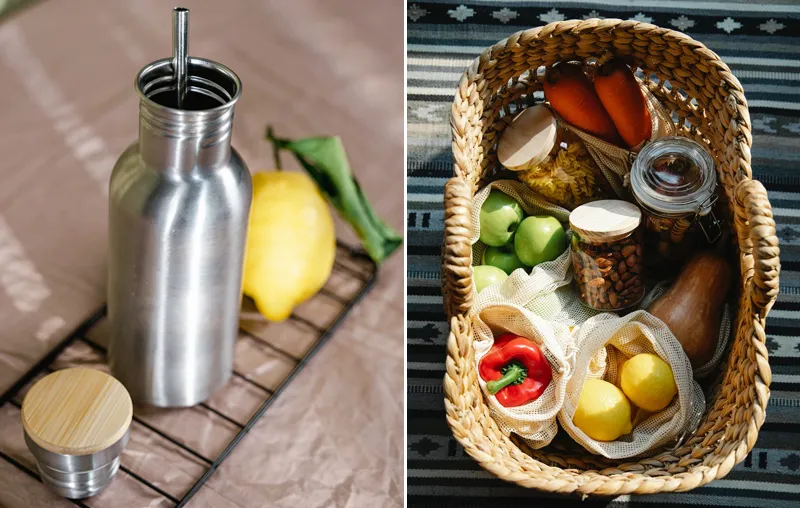What can sustainable gastronomy look like in practice? And what can restaurants do to become more environmentally friendly? If you're looking for answers to these questions, you've come to the right place! Developing a coherent concept, offering delicious food, hiring good staff, taking guests' wishes into account - there are countless measures to make a restaurant successful in the long term.
Unfortunately, the aspect of sustainability is often neglected. Yet the greatest ecological challenges of our time awareness of a more sustainable way of life is also becoming increasingly important in our society.
Restaurants, cafés, canteens, catering companies, restaurants and hostels serve an incredible number of people every day and can therefore make a decisive contribution to environmental protection - and also benefit enormously themselves.
In this article, I would like to introduce you to the best tips, ways and means for more sustainability in the restaurant industry. Use them, for example, to make your own restaurant more environmentally friendly and sustainable - or to make suggestions for improvement to restaurateurs. Let's go!
Advantages: Why is it important for the hospitality industry to promote sustainability?

Sustainability in the food service industry means that a food service business generate profits in an environmentally friendly and socially responsible way. But what exactly is the incentive? Why should restaurateurs rethink and make their business greener?
Before we get straight into the specific practical tips, here are a few more motivating reasons listed:
- Climate and environmental protection: Environmentally conscious restaurateurs specifically reduce their consumption of resources and therefore also their ecological footprint - and thus make a significant contribution to protecting the planet for our own generation and, above all, future generations.
- Raising awareness: Restaurants and cafés have the unique opportunity to make sustainable action palatable to their guests - in the truest sense of the word. As a valuable part of the local community and everyday life, restaurants therefore also have a special responsibility for a better future.
- Economic success: Sustainable practices help to reduce costs in your own catering business in the long term. This works, for example, by consciously minimizing energy consumption and food waste.
- Guest requests: More and more consumers are attaching great importance to sustainability. Catering businesses that recognize this change in values, take it seriously and implement appropriate measures will therefore gain a long-term, additional competitive advantage.
18 tips: What can restaurants, cafés and other hospitality businesses do to be more sustainable?
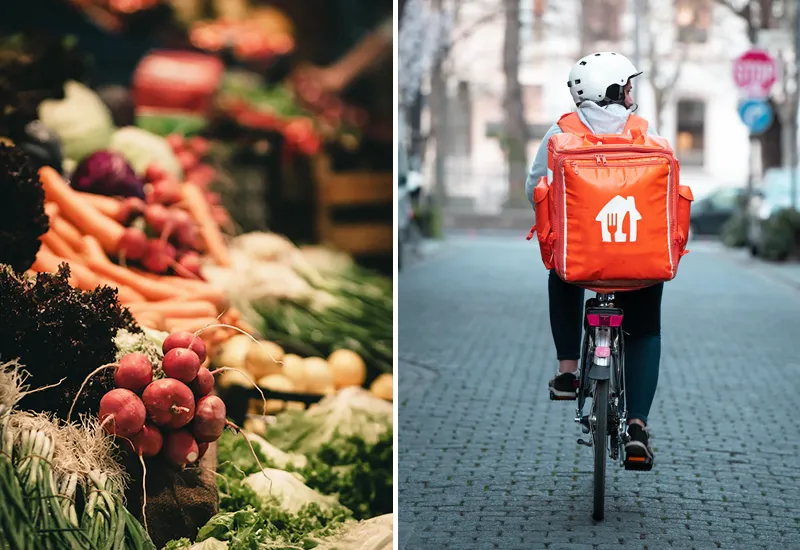
Now you know why the promotion of Sustainability in the catering industry is so important for the environment - and also that it brings (gastronomic) economic benefits. Motivated enough? Then let's talk directly Go to the promised tipsthat you can implement as a restaurant operator or suggest as a guest of a restaurant.
1. focus on fresh, seasonal organic food
The meals on offer are the magnet that regularly attracts guests. Instead of energy-intensive frozen food sustainable gastronomy should therefore naturally give preference to high-quality, fresh organic food from organic farming (and, if necessary, in compliance with organic animal welfare standards). They are grown without the use of toxic pesticides, are richer in nutrients, promote species conservation and simply taste much more genuine and intense.
Innkeepers who are committed to sustainability are also well advised to make their Align the menu and the products on offer with the seasons. By buy food that is currently in seasonnot only provides variety - it also avoids long transportation routes and high water consumption in dry growing regions of other countries.
2. offer vegan meals
The The number of vegetarians and vegans is steadily increasing - not only for reasons of animal ethics, but also for ecological reasons. The production of plant-based food causes significantly fewer greenhouse gas emissions and is generally much more energy and resource efficient.
From my own experience, I can confirm that this is why people usually take a closer look at the menu before visiting a restaurant. Restaurants lose without vegetarian or purely plant-based options then this potential and constantly growing target group.
Expanding the range to include plant-based alternatives (e.g. vegan burgers, schnitzel or meatballs) is really easy these days - also because more and more Food suppliers recognize the change have. Many restaurateurs even decide to for moral, environmental and also health-related reasons in favor of offering only plant-based and animal-free meals.
Tip: Why I personally live vegan and how you Find vegan restaurants near you you can find out by clicking on the respective links.
3. save energy in a targeted manner
Whether at the Cooking, at the Lighting, about the Dishwasher or the Freezer roomA restaurant consumes an enormous amount of energy, even directly in its day-to-day operations. For more sustainability, you as a restaurateur should therefore use energy-efficient appliances and light sources - and also invest in a Better building insulation invest. Such changes ultimately make the company not only more climate-friendly, but also more economical.
Even very simple measures, such as the Cooking with lid, the Use of timers or the Short bursts of ventilation instead of the tilt window, which is always open, help decisively, Save electricity. It should not be forgotten that green electricity from renewable sources should generally be used.
4. cooperate with fair, regional producers and suppliers
Of course, sustainable restaurateurs should also cooperate with local producers and suppliers who follow a similarly green philosophy and the Fairtrade concept. In this way, the entire supply chain more environmentally friendly and transparent.
The focus on partnerships with agricultural businesses and service providers from the region, also strengthens the local economy. At the same time it is a attractive argumentwhich should convince even more guests of its own overall gastronomic concept.
5. minimize CO2 emissions from deliveries
In order to make a catering business sustainable, delivery trips by car should also be minimized as far as possible and planned in a resource-saving manner. The CO2 emissions can be reduced, for exampleby switching to a more environmentally friendly Bicycle couriers sets. The Strategic route planning and bundling of deliveries to avoid unnecessary journeys.
This commitment automatically promotes your own public image. For example, because experience has shown that it is seen and appreciated by customers ordering at the front door.
6. avoid paper and plastic waste as far as possible
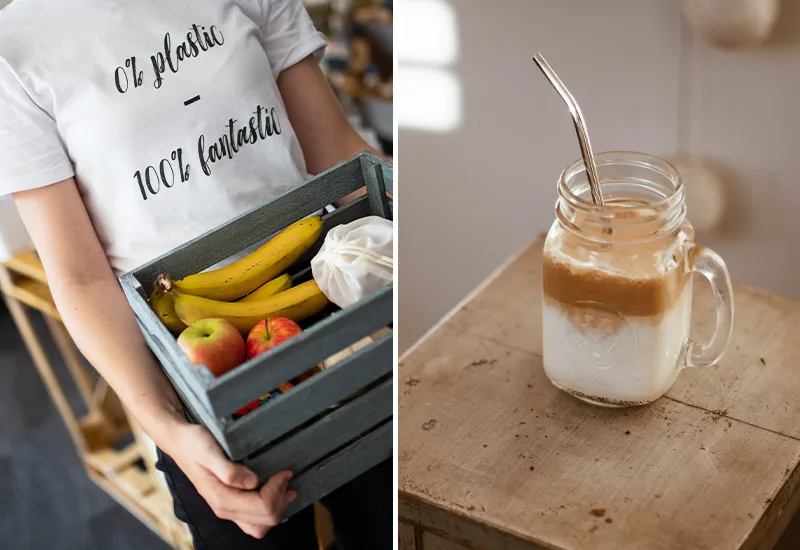
Whether through Food packaging, straws, plastic bottles, drinks cans, cutlery, napkins or CoffeeToGo mug: The catering industry produces a particularly large amount of waste. This is mainly due to disposable products (which are very expensive in the long run).
By taking a few Zero waste basic rulesthrough incentives for local consumption and the Switching to reusable alternatives (e.g. cloth napkins or stainless steel straws), the generation of paper or plastic waste can be decisively counteracted.
As an environmentally conscious restaurateur, you can, for example, offer your customers the option of having their Deliver orders in reusable containers for a small deposit. These can then be exchanged with the next order, for example, or handed in at the restaurant at any time.
7. separate and compost waste correctly
Waste cannot be completely avoided. For more sustainability in the catering industry, the proper waste separation essential. Collect and dispose of paper, glass, plastic, residual waste and non-compostable organic waste separately, makes recycling easier - i.e. the recycling of materials.
Restaurants, canteens and cafés can also compost organic waste such as vegetable and fruit peelings. This then produces, for example Fertile soil for your own fruit, vegetable or herb garden.
8. consciously save water
Water is a valuable, natural resource. It can be protected not only indirectly by giving preference to seasonal and plant-based foods, but also directly. An environmentally friendly restaurant helps, for example Water-saving fittings, the Eco mode of the dishwasher and the targeted Raising employee awareness to achieve as much as possible in day-to-day Save water.
Also through the Collecting rainwater and its use for the irrigation of plants, can have a positive impact on the operational Water Footprint significantly.
9. use natural furnishings and decoration
If I had my own restaurant, I would probably try to design the interior as individually as possible in order to feel stand out from the gastronomic competition.
Natural tables and chairs made from Wood from ecological forestry, restored cupboards and to Flower vases repurposed preserving jars, for example, could help here. However, there really are no limits to creativity in this respect.
Even the most Compact arrangement of seating options rounds off the sustainable gastronomy concept. Ultimately, the space is optimally utilized and the energy consumption per guest is minimized.
10. place plants and create green seating areas
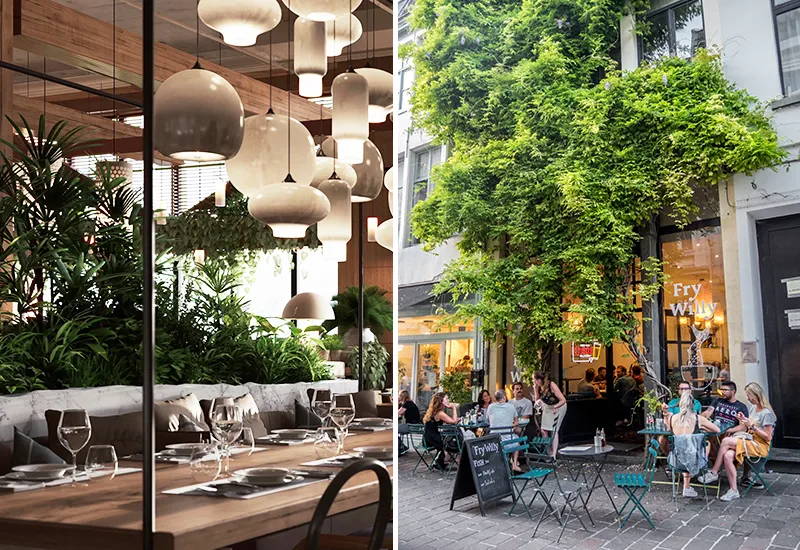
The integration of standing and hanging plants into the restaurant design creates a natural atmosphere. In addition, restaurateurs promote the Well-being of their guests - also because the plants positive effect on the indoor climate impact.
Depending on the location and the possibilities on site, tables and chairs should also be placed outside or in a green area in order to create a pleasant atmosphere. Gastronomic experience in harmony with nature manufacture.
Ideally, guests can enjoy not only bee-friendly trees, perennials and shrubs in the hotel's own garden, but also the Raised beds with home-grown herbs and a variety of fresh fruit and vegetables for the dishes served.
11. avoid food waste
Not only what you do, but also what you don't do can be sustainable. In order to waste less expensively produced food, environmentally conscious restaurateurs should, for example to offer their guests a huge all-you-can-eat buffet to offer. After all, more is ultimately produced than is actually consumed in the end.
In sustainable gastronomy, the focus is instead on Portions set to meet the needs of the guests. This not only protects the environment and prevents the generation of tons of food waste. Going without also promotes more conscious eating behavior, as well as the Appreciation for the food on offer.
Plan your shopping well, store food properly and use it completely and also sometimes prefer bent fruit and vegetables, are further means to avoid food waste.
12. support local environmental initiatives
Sustainable restaurants can offer their further increase ecological impactby participating in local green initiatives and projects.
Here are a few ideas on my part as a little inspiration:
- FoodSharing: To demonstrate respect for food, it is advisable to participate in the so-called FoodSharing on site. This involves rescuing leftover food or meals from the garbage can by making them available for other people to eat or for distribution to social shelters.
- ReCup: This is an initiative for cafés that counteracts the amount of waste generated by CoffeToGo cups. Participating cafés serve to-go drinks in returnable deposit cups, which customers can return to other participating cafés.
- TooGooToGo: In this app, a restaurant can offer leftover meals at reasonable prices. Users then simply collect them on site and may become aware of the environmentally conscious restaurant for the first time.
- "Best leftovers" boxes: With the box made from FSC-certified kraft paper, restaurants can give their guests leftovers from their meals to reheat later. The idea for "Restlos genießen" came from the Greentable initiative (which also awards quality seals for sustainable gastronomy) and "Zu gut für die Tonne".
Basically, this list could be continued indefinitely. For example, restaurateurs can also get involved in community gardens, by Support animal welfare project financially or at a participate in a municipal program to reduce energy consumption.
13. use environmentally friendly cleaning agents
Natural cleaning agents are recommended to keep the restaurant or café hygienically clean in a sustainable way. Who dispenses with the use of harmful chemicalsUltimately, this not only protects the environment, but also the health of staff and guests. This is an important tip for managing your business as sustainably as possible.
14. raise awareness of environmental protection and one's own commitment
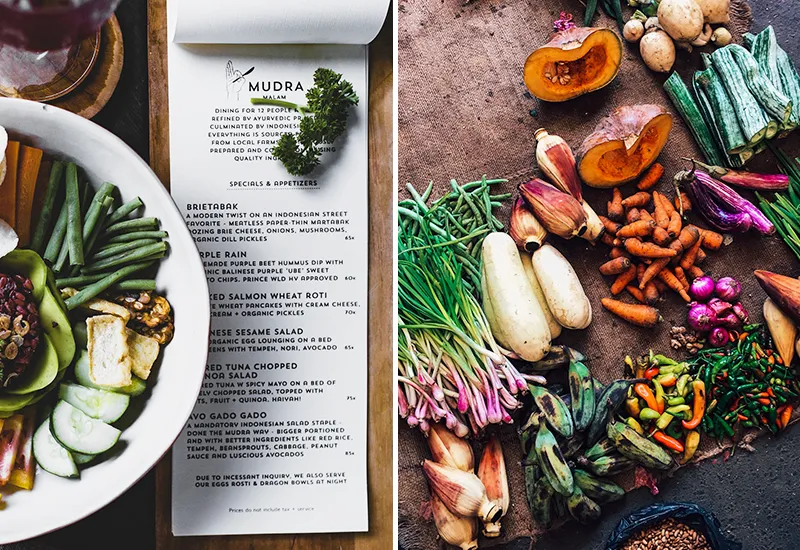
Sustainable gastronomy is aware of its educational mission and knows that it has the Actively shaping positive change in society can.
The dishes on the menu are not the only great way to do this. also the menu itself represent. Used correctly, it is a powerful tool for raising awareness.
As a restaurateur, you can be honest and transparent there (and on the menu board), for example Information about the origin of the ingredientsThe restaurant can emphasize the cooperation with local producers or the ecological impact of the food on offer. Charming slogans can also be used, for example, to encourage diners to only order as much as they can eat.
Incidentally, your own Internet presence to attract new customers and inform them about the company's commitment. We recommend a website with sustainable web designwhose server runs on energy from hydropower, for example.
15. promoting sustainable HR management and inclusion
Sustainable human resources management should long-term success of the restaurant business. For example, through a high level of satisfaction and, as a result very productive, healthy, motivated and innovative employees.
For example fair wages, Equal rightsthe promotion of disabled and disadvantaged people and last but not least the regular Work in an open, respectful catering company with added value for the environment and society at.
Examples: Which businesses are already successfully implementing sustainability in the catering industry?
In the world of gastronomy, there are numerous impressive examples of businesses that have seized the opportunities offered by the sustainable restaurant management and are already successfully implementing the principle.
Here I would therefore like to conclude some of the most environmentally friendly restaurants and cafés in Germany. Feel free to pay them a visit, recommend them to others or use them as personal inspiration for your own business.
- Wolf cub: You can enjoy vegan star cuisine at this organic restaurant in Hamburg. The food is either sourced locally or even from the restaurant's own garden.
- FREA: The trendy Berlin restaurant is the first purely vegan zero waste restaurant in the world. For example, the team works with regional, organic farmers and composts the leftovers on site. Suppliers can then use them again.
- Colorful burgers: This vegan organic restaurant in Cologne also offers sustainable catering on site. Among other things, 100% biodegradable packaging material, green electricity and ecological cleaning agents are used.
- Golden rocket: This Munich restaurant serves sustainable organic bowls and burgers - vegans and vegetarians can also enjoy a huge selection on the menu.
- Zero-waste café Isla Coffee: The Berlin café is a prime example of the circular economy and sustainability. For example, leftover frothed milk is collected there to make the café's own ricotta or bread pudding.
- …
By the way: I have found ways and means to eat vegan in really every restaurant to be able to. If you want to know how to do this, you can find the relevant tips in the linked blog post.
Sustainable gastronomy, made easy!
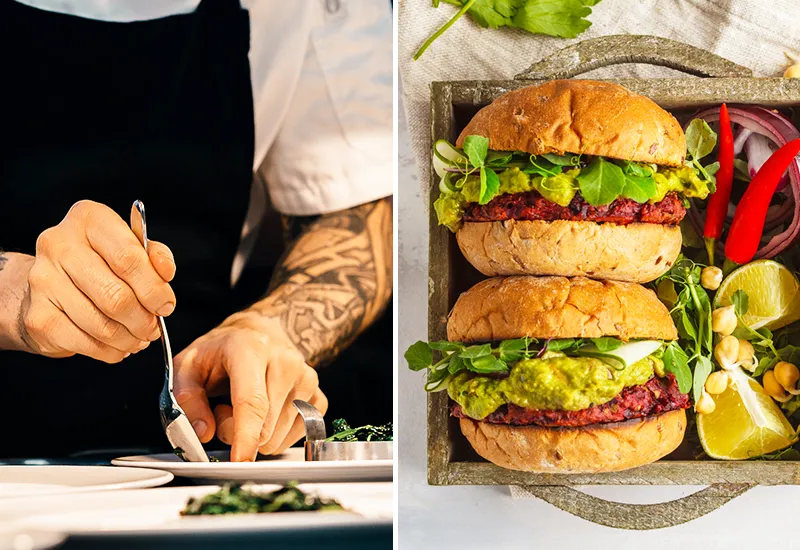
Whether it's Michelin-starred cuisine or fast food, a restaurant, café, hostel or canteen: in the end, conscious, sustainable gastronomy is what counts. not only a real opportunity for the environment and our society, but also for the success of our own company.
So if you have a own, manage or work in a catering businessyou should use them. And even if you go out to eat again, you should be aware of the fact that even a simple suggestion for improvement to a waitress or waiter can have a massive positive impact.
"Reason starts in the kitchen."
Friedrich Wilhelm Nietzsche (more at Food quotes)
I hope I have been able to help you with this article on sustainability in the catering industry. Do you have any questions, suggestions or your own experiences in this area that you would like to share? Then feel free to write me a comment.
Stay sustainable,

PS: Are you toying with the idea of setting up an environmentally and socially responsible restaurant yourself? Then you are also welcome to use my Tips for sustainable founding. Good luck!






